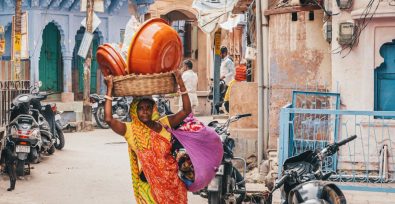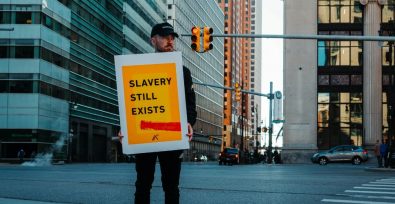In Bangladesh, a recent formal dialogue was held between local advocates, survivors and experts. The conversation highlighted key gaps in the national labor laws. It particularly emphasized how the absence of legal recognition and protection for domestic workers is creating conditions where exploitation thrives. From labor exploitation to child slavery, without binding legal frameworks, domestic workers throughout the country who find themselves victims of modern slavery are left with few pathways to justice or freedom. That’s why the group is advocating for change.
Ratification to prevent exploitation
The title of the event jointly organized by Shobujer Ovijan Foundation, Oxfam in Bangladesh, The Daily Star, and co- funded by The European Union, was “Transforming Policy into Law: Domestic Workers’ Rights and Implementation Barriers.” The primary objective was to advance the process of formally recognizing domestic workers as labor. A change that would go a long way towards ensuring domestic workers’ inclusion in relevant legal frameworks. Thus, giving them options in cases of abuse and exploitation.
As reported in The Daily Star, Khadeja Akter Antora, Program Officer at Oxfam in Bangladesh said,
“The absence of legal recognition leaves domestic workers vulnerable to exploitation and abuse, both domestically and abroad. Including them in the national labor law is crucial—not only to ensure their safety, security, and fundamental rights, but also to hold employers accountable.”
Globally, protecting domestic workers made a vital step forward with the ratification of the International Labor Organization (ILO) Convention No. 189. The convention calls for protection and decent working conditions for domestic workers worldwide. Sadly, Bangladesh has yet to ratify this crucial convention. But now may be an opportune moment to move towards ratification. Attendees felt the current political context and the presence of a non-partisan interim government may have opened a window of opportunity for positive change.
Domestic workers are human beings, treat them that way
Unfortunately, labor laws in Bangladesh still permit children under age 14 to work as domestic laborers. In addition, law enforcement often sides with employers in disputes. This leaves workers trapped in cycles of exploitation. That’s why the ILO Convention 189 is not only a matter of labor rights but also a crucial anti-trafficking measure. By ensuring legal recognition, enforceable contracts, fair wages, and protections against abuse, Bangladesh can reduce the structural vulnerabilities that traffickers exploit.
Parveen, a domestic worker from Kallyanpur, Beneficiary of Shobujer Ovijan Foundation and a survivor of labor exploitation shared:
“We often did not receive our daily or monthly wages on time (but) in disputes between domestic workers and employers, law enforcement often sides with the employer, making it difficult for us to get justice. My demand is to treat domestic workers as human beings. Show us dignity, respect, and humanity—just as every individual deserves.”
By ensuring legal recognition, enforceable contracts, fair wages, and protections against abuse, Bangladesh can reduce the structural vulnerabilities. Vulnerabilities that traffickers and abusers continue to exploit. In Bangladesh as in most places, incidents of injustice against domestic workers rarely receive media attention. And without a binding legal framework, cases of exploitation often fail to progress beyond the initial stage of investigation. Attendees felt strongly that the absence of specific legislation was “significantly hampering the delivery of justice” for survivors.
Domestic workers deserve protection and dignity
Antora pointed to the need for legal reform, combined with community empowerment as essential to building a more just and inclusive society. One where every domestic worker in Bangladesh is recognized, protected, and treated with dignity.
Freedom United echos Antora’s words and supports the global standard of Convention 189 to protect domestic workers everywhere. Stand with us and add your voice to those of domestic workers and advocates calling on governments everywhere to immediately ratify Convention 189 and help protect children and adults from domestic slavery.







Freedom United is interested in hearing from our community and welcomes relevant, informed comments, advice, and insights that advance the conversation around our campaigns and advocacy. We value inclusivity and respect within our community. To be approved, your comments should be civil.